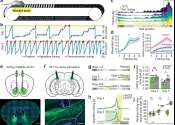Last update:
Psychology & Psychiatry news
Psychology & Psychiatry
No negative impact from prolonged eye patching on child's development or family stress levels
Parents of children with unilateral congenital cataracts (UCC) may wonder how long to patch, and whether extended periods of patching might affect their child's development or cause undue stress for the child or family, particularly ...
4 hours ago
0
5
Psychology & Psychiatry
Molecular atlas shows how the growth factor erythropoietin affects neurons
A new study that including participants from the Central Institute of Mental Health in Mannheim shows how the growth factor erythropoietin (EPO) protects and regenerates nerve cells in the brain. In particular, the important ...
10 hours ago
0
23
Digital cognitive therapy can help treat obsessive taboo thoughts
Are you tormented by an exaggerated fear of harming your child? Relax—it's common, and research shows that it's also treatable.
4 hours ago
0
0

Divisive diagnosis raised in George Floyd case under scrutiny
A movement to discredit a controversial medical diagnosis is being bolstered by a new study out of McGill University. Excited delirium describes a state of agitation, aggression, and distress and has become a common defense ...
4 hours ago
0
0

Scientists uncover 95 regions of the genome linked to PTSD
In post-traumatic stress disorder (PTSD), intrusive thoughts, changes in mood, and other symptoms after exposure to trauma can greatly impact a person's quality of life. About 6% of people who experience trauma develop the ...
15 hours ago
0
76

Children who delay gratification more likely to do well academically, have fewer behavioral problems, study finds
Suppose you were given a choice between having a smaller reward now and getting a larger reward 10 minutes later. For most adults, the choice is clear. Withstanding short-term temptation in pursuit of a greater long-term ...
4 hours ago
0
0

Pilots, and airlines, are struggling with mental health. Here's what they're doing to help
Captain Robert Graves sees strangers every day as a pilot for Southwest Airlines.
7 hours ago
0
0

Dialogue between brain regions: How memories guide us to rewards
Picture this: You want to take a walk to your favorite ice cream parlor for the first time after winter. You can probably remember how to get there. How does our brain guide us to such rewarding places? In a study recently ...
Apr 17, 2024
0
26

Understanding the brain mechanisms behind emotion processing bias in treatment-resistant depression
One potential underlying cause of symptoms in individuals with depression is an emotion-processing bias which causes them to have a stronger response to negative information more so than positive. While prior research has ...
Apr 17, 2024
0
27

Emotional radio ads may ease listeners' qualms, boosting support for organ donation
Radio ads with an emotional appeal—featuring personal stories of either a happy organ transplant recipient or a sad patient languishing on the waiting list—increase non-donor listeners' support for organ donation and ...
Apr 17, 2024
0
0

Wearable headcams provide insight into complex teen emotions
As part of a joint study between King's College London and Manchester Met, wearable headcams worn in real interactions and face decoding technology were used to read teens' facial expressions, potentially uncovering hidden ...
Apr 17, 2024
0
11

Most homeless Americans are battling mental illness
Two-thirds of homeless people are experiencing some form of mental health disorder, a large, new review of data on the subject.
Apr 17, 2024
0
4

Rapid transitions seen from neutral to negative emotional states in PTSD
Individuals with post-traumatic stress disorder (PTSD) undergo rapid transitions between neutral and negative emotional states, which are intensified by emotional numbing symptom severity, according to a study published online ...
Apr 17, 2024
0
2

Study finds punitive anti-drug workplace policies could backfire
A new study from the Texas A&M University School of Public Health uses national data on drug use and mental health to explore how workplace drug policies correlate with opioid use and misuse and psychological distress in ...
Apr 17, 2024
0
0

Conformity to masculine gender norms linked to muscle dysmorphia among young people
A new research study out of the University of Toronto sheds light on the intricate relationship between conformity to masculine gender norms and muscle dysmorphia symptomatology among a diverse sample of Canadian adolescents ...
Apr 17, 2024
0
0

Why doesn't my digital music feel like 'mine'? Three ways digital possessions reduce our sense of ownership
Our possessions—the things we view as "mine"—play an important role in our lives. Beyond their functionality, they can serve as poignant reminders of cherished memories. They can symbolize not only who we are, but also ...
Apr 17, 2024
0
0

Hoarding can start in childhood—here's why early intervention is so crucial for all age groups
A lot of people think of hoarding as something extreme—a home crammed to the ceiling with possessions. But it tends to start gradually, and research has found it can begin in adolescence or even childhood.
Apr 17, 2024
0
1

Families including someone with mental illness can experience deep despair—they need support
In the aftermath of the tragic Bondi knife attack, Joel Cauchi's parents have spoken about their son's long history of mental illness, having been diagnosed with schizophrenia at age 17. They said they were "devastated and ...
Apr 17, 2024
0
0

Study suggests adolescent stress may raise risk of postpartum depression in adults
In a new study, a Johns Hopkins Medicine-led research team reports that social stress during adolescence in female mice later results in prolonged elevation of the hormone cortisol after they give birth. The researchers say ...
Apr 16, 2024
0
10

Biodiversity is key to the mental health benefits of nature, new study finds
New research from King's College London has found that spaces with a diverse range of natural features are associated with stronger improvements in our mental well-being compared to spaces with less natural diversity.
Apr 16, 2024
0
8













































